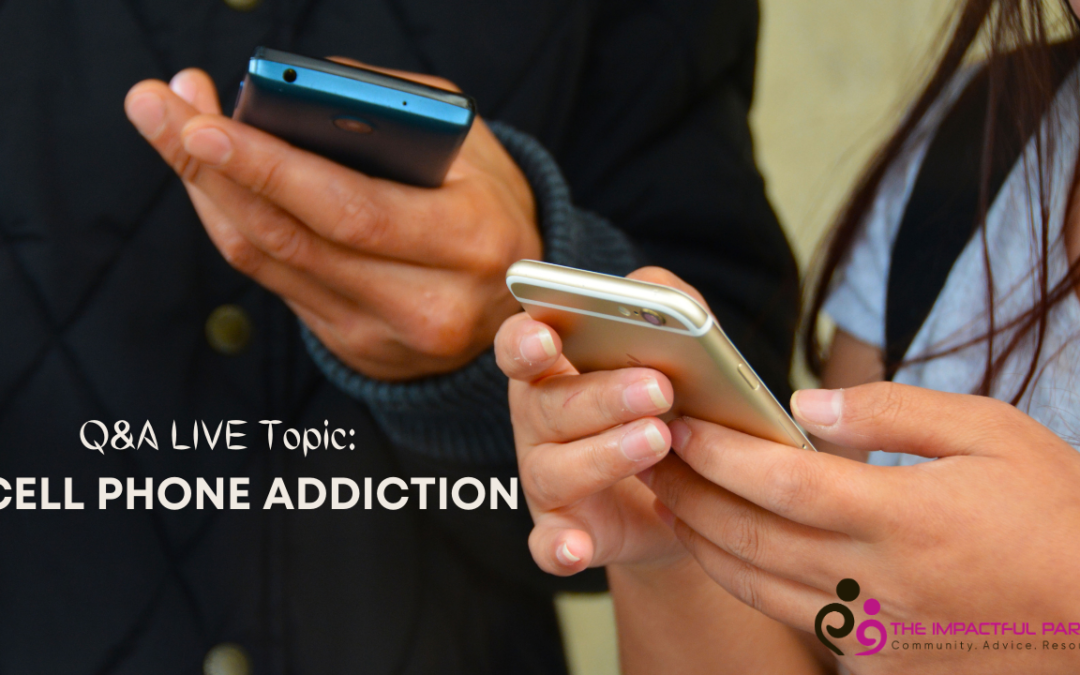Cellphone Addiction In Adolescent
Signs of a teenager’s Cellphone Addiction. What is too much screen time? How to manage it?
Screen addiction is real. Today’s Question and Answer Live is: What are the signs of being addicted to the cell phone. What is too much screen time. And how to manage screen time with a teenager.
Before I begin, I want to preface a few things. First of all, today’s answer will sound negative because the questions today revolve around the negative effects of phones’ over-use. That is our content’s focus; however, I don’t believe that all technology is bad. Technology has some major benefits for our young people when used appropriately. Besides, this is such an important topic because technology is not going away. We have to teach our children how to manage technology in healthy ways to continue teaching their children the same lessons. Screens are here to stay, so let’s educate ourselves as parents on how to teach our children to navigate them well.
There has been a decline in adolescent mental health since the influx of cellphone in the newer generations. More teens are depressed, and there has been an increase in suicide attempts. So this issue is real and shouldn’t be ignored.
Ironically, despite being able to connect with anyone in the world in seconds, most people report that they are lonelier than they have ever been before. This just shows that our connections with others via Snapchat and text messages are very shallow. Our young people are missing the interpersonal connection with their peers that they need. You can not replace the connection that in-person interactions produce. Even voice-to-voice contact is much better than text messages.
This lack of connection with peers is not necessarily entirely your child’s fault. I see two huge problems that prevent children from connecting as they used to 30 years ago.

Cellphone Addiction
- Parents aren’t letting their kids get out anymore.
Gone are the days of letting your child run around the neighborhood and explore. “Come back before dinner and be careful” is not the norm of today’s city living. Of course, our intentions to keep our children safe is valid, but that doesn’t mean that it isn’t affecting our children in other ways.
- The second reason is much more prevalent. It is the competition and nature of the social media platform. Each website online is competing for your attention. The goal of YouTube, Pinterest, Google, Facebook, Instagram, Snapchat,… ALL social media platforms are to keep you on their website as long as possible. To do that, the internet algorithms keep track of what you watch, like, share, save. Then the algorithms provide you more similar content to stay on the channel and engaged. The owner of each website is rewarded when you stay with them and watch their content. Even me! The more you share, push the like button, watch my videos, and save my posts, – the more the algorithms will like me and push out my content to more people who also watch similar videos. Websites will also keep you engaged by using researched, attracting techniques, such as bright colors, non-stop entertainment, and playing video after video with no pause. Some platforms like Snapchat make the engagement a game to keep kids wanting more. Snapchat gives the user reward points for each post or interaction with others.
This non-stop stimulation of the things kids love causes an increase in their dopamine levels in their brain. Dopamine is the chemical our brain makes to tell us that we are happy. When we stop looking at the screen, the dopamine levels drop, making us want more. Kids then find themselves in a cycle of seeking out more and more dopamine to stay happy. This is how the addiction starts.
So, as you can see, screen addiction is not entirely your child’s fault. In some respects, they are victims of a system that lures them in.
How do we know when your child has crossed the tipping point from regular phone use to addiction?
Cell phone addiction can have any of the following signs:

Cellphone Addiction
- Sleep disturbances. Insomnia is common with screens because of the constant stimulation. This is a real problem and needs to be addressed immediately.
- Anxiety and irritability due to withdrawal. Is your child craving more dopamine?
- Feelings of loneliness.
- Feelings of ‘needing’ likes on their post to feel validated.
- Feelings of missing out if they aren’t on their phones consistently. This usually manifests itself in needing to be on their phone all the time, including driving, eating, etc.
- Loss of interest to do other interactive, engaging activities.
How much is too much screen time?
The experts say that teens should be active at least 15 minutes for every hour of screen time and suggest no more than 2 hours of screen time per day. My own personal suggestion is to turn off screens at least one hour before bedtime also. It takes about that long to desensitize from the screen stimulation and relax so your child can fall asleep.
What can parents do to manage their child’s screen time?
Tip 1: Talk to your child about the impact of technology use and screens like I did with you today. Show them this video or other similar videos available. Sometimes kids don’t want to hear the facts from you but will be more receptive if they hear the effects of technology from experts.
Tip 2: Teach your child to be intentional with their time on their phone by limiting their screen time with available apps. There are several apps that parents can purchase that monitor electronics. I use Qustodio personally in my own home. Still, there are several similar apps out there that can easily be googled and installed on your child’s devices. These apps can limit the times of day your child can access the functionality of their phone, limit the use of particular apps, limit the time duration your child can use their device, block explicit content, block particular apps, and more.
Tip 3: Intentionally create screen-free spaces and times in your child’s day for no technology.

Cellphone Addiction
- Make rules for your home, like no phones at the dinner table. No phones from 5-6pm. No phones when you are having a conversation with someone.
- Keep your child busy with scheduled activities that discourage screens like participating in sports, going for a bike ride, different clubs at school, etc.
- Go on a digital fast for a day and reward your child for their no-screen efforts.
- Encourage your child to talk to their friends on the phone instead of texting their friends.
- And lastly, you have to model good technology use yourself. If you don’t practice what you preach, then your child will never listen to you. You must also be willing to abide by the rules you are creating in your home.
Technology use and limitation have to start with a conversation with your child. You should reward them for the behaviors you want to see. If your child puts down the phone for even an hour more than they usually do, reward them for those efforts and begin to increase those time little by little until it seems seamless.
You got this, parents. I am just here to help.
——
For more Impactful Parent content, SUBSCRIBE TO THE IMPACTFUL PARENT YOUTUBE CHANNEL. New videos are released each week. https://theimpactfulparent.com/youtube
Do you have a child that struggles with ANXIETY? I CAN HELP! The FREE webinar on my fully online course to help children with big emotions will give you the framework you need to see a change in your child’s behaviors! Check it out at https://theimpactfulparent.com/anxiety-webinar
PLUS- follow The Impactful Parent on social media and check out https://theimpactfulparent.com Free Resources and More Impactful Parent content on the website!
Facebook: www.facebook.com/theimpactfulparent
Instagram: www.instagram.com/theimpactfulparent
Pinterest: www.pinterest.com/theimpactfulparent
LinkedIn: www.linkedin.com/company/theimpactfulparent
Twitter: www.twitter.com/impactfulparent
Podcast: https://theimpactfulparent.com/parenting-podcast
Follow The Impactful Parent for more FREE tips and resources. Real advice. Real issues. Period. @theimpactfulparent Helping parents of school-age children.

